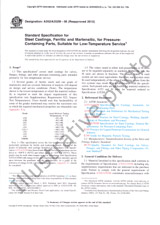We need your consent to use the individual data so that you can see information about your interests, among other things. Click "OK" to give your consent.
ASTM C553-13(2019)
Standard Specification for Mineral Fiber Blanket Thermal Insulation for Commercial and Industrial Applications
Translate name
STANDARD published on 1.9.2019
The information about the standard:
Designation standards: ASTM C553-13(2019)
Note: WITHDRAWN
Publication date standards: 1.9.2019
SKU: NS-973571
The number of pages: 5
Approximate weight : 15 g (0.03 lbs)
Country: American technical standard
Category: Technical standards ASTM
The category - similar standards:
Annotation of standard text ASTM C553-13(2019) :
Keywords:
blanket, glass fiber, high temperature, mineral fiber insulation, rock fiber, shot, shot content, slag fiber,, ICS Number Code 91.100.60 (Thermal and sound insulating materials)
Additional information
| 1. Scope | ||||||||||||||||||||||||||||||||||||||||||||||
|
1.1 This specification covers the classification, composition, physical properties, and dimensions of mineral fiber (rock, slag, or glass) blanket intended for use as thermal insulation on surfaces operating at temperatures between 0°F (–18°C) and 1200°F (649°C). For specific applications, the actual temperature limits shall be agreed upon between the supplier and the purchaser. 1.2 The orientation of the fibers within the blanket is primarily parallel to the principal surface (face). This specification does not cover fabricated pipe and tank wrap insulation where the insulation has been cut and fabricated to provide a fiber orientation that is perpendicular to the surface (face). 1.3 For satisfactory performance, properly installed protective vapor retarders must be used in below ambient temperature applications to reduce movement of water vapor through or around the insulation towards the colder surface. Failure to use a vapor retarder can lead to insulation and system damage. Refer to Practice C921 to aid material selection. Although vapor retarders are not part of this specification, properties required in Specification C1136 are pertinent to application or performance. 1.4 This standard does not purport to provide the performance requirements of hourly-rated fire systems. Consult the manufacturer for the appropriate system. 1.5 The values stated in inch-pound units are to be regarded as standard. The values given in parentheses are mathematical conversions to SI units that are provided for information only and are not considered standard. 1.6 This standard does not purport to address all of the safety concerns, if any, associated with its use. It is the responsibility of the user of this standard to establish appropriate safety, health, and environmental practices and determine the applicability of regulatory limitations prior to use. 1.7 This international standard was developed in accordance with internationally recognized principles on standardization established in the Decision on Principles for the Development of International Standards, Guides and Recommendations issued by the World Trade Organization Technical Barriers to Trade (TBT) Committee. |
||||||||||||||||||||||||||||||||||||||||||||||
| 2. Referenced Documents | ||||||||||||||||||||||||||||||||||||||||||||||
|
We recommend:
Technical standards updating
Do you want to make sure you use only the valid technical standards?
We can offer you a solution which will provide you a monthly overview concerning the updating of standards which you use.
Would you like to know more? Look at this page.




 Cookies
Cookies
